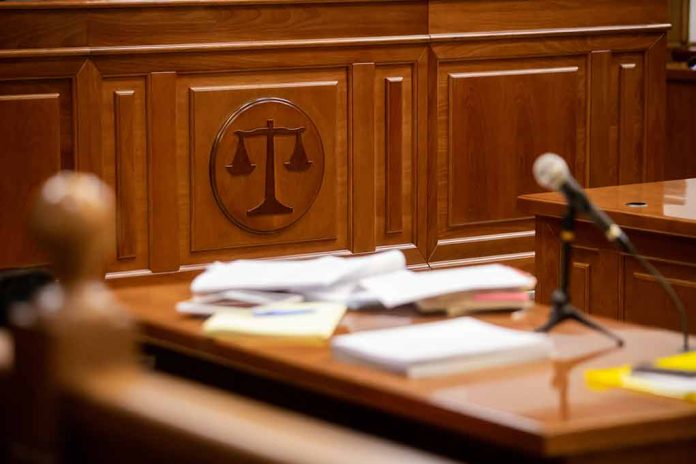
Supreme Court’s decision to allow a lawsuit challenging Virginia’s felon voting ban to proceed marks a pivotal moment in the ongoing battle over voting rights for those with criminal records.
Key Takeaways
- The Supreme Court unanimously rejected Virginia’s request to dismiss a lawsuit challenging the state’s lifetime voting ban for convicted felons.
- The lawsuit, O’Bannon v. King, will now proceed through the lower courts despite Virginia’s attempts to halt it.
- The Court issued its decision as an unsigned order with no dissenting opinions from any justices.
- This case could potentially impact how states handle voting rights restoration for millions of Americans with felony convictions.
- The Supreme Court did not explain its decision to reject Virginia’s request.
Constitutional Challenge to Felon Disenfranchisement Moves Forward
In a significant development for voting rights advocates, the Supreme Court has allowed a lawsuit challenging Virginia’s practice of permanently disenfranchising individuals with felony convictions to move forward. The case, O’Bannon v. King, represents a direct challenge to state policies that automatically strip voting rights from citizens with felony records. Virginia officials had asked the Supreme Court to dismiss the case outright, arguing that the state has the constitutional authority to determine voter qualifications, including restricting ballot access for those convicted of serious crimes.
The Supreme Court’s rejection of Virginia’s request came in the form of an unsigned order with no accompanying explanation, a common practice for such procedural decisions. Notably, none of the justices registered dissent with the decision, suggesting a unified Court position on allowing the legal challenge to proceed through normal judicial channels. This doesn’t indicate how the justices might ultimately rule if the case returns to them after lower court proceedings, but it does ensure the constitutional questions raised will receive full consideration.
I’ve previously criticized amicus briefs that get facts and studies wrong, misleading courts in the process. Let me take to task one from a group I otherwise support, the @ReasonFdn .
The en banc Fifth Circuit is hearing Hopkins v. Hosemann, a SPLC suit against Mississippi over…
— tedfrank (@tedfrank) December 19, 2023
The Human Impact of Voting Restrictions
At the center of this legal battle are plaintiffs like Tati Abu King and Toni Heath Johnson, whose experiences highlight the personal impact of Virginia’s felon disenfranchisement policies. King’s situation is particularly illustrative of the system’s complexities – he initially had his voting rights restored following a robbery conviction, only to lose them again after a subsequent offense. This cycle of restoration and revocation demonstrates the precarious nature of voting rights for those with criminal records in Virginia and similar states.
The American Civil Liberties Union (ACLU) and other legal advocacy organizations have thrown their weight behind this lawsuit, arguing that permanent disenfranchisement violates fundamental constitutional rights. Their position directly challenges the longstanding practice in Virginia and several other states that either permanently bar felons from voting or create substantial hurdles to rights restoration. Opponents of these restrictions argue they disproportionately impact minority communities and create a permanent underclass of citizens unable to participate in democracy.
Conservative Perspective on Felon Voting Rights
For many conservatives, the question of felon voting rights presents a complex balance between accountability for criminal actions and the potential for rehabilitation and reintegration into society. Traditional conservative values emphasize personal responsibility and consequences for lawbreaking, which has historically supported restrictions on voting for those who violate society’s most serious laws. However, there’s growing recognition across the political spectrum that permanent disenfranchisement may undermine other conservative principles like redemption and limited government intervention in citizens’ lives.
Virginia’s current system requires individual case review by the governor for rights restoration, creating a potentially arbitrary process that gives tremendous power to a single executive. This approach raises legitimate questions about whether such discretionary authority aligns with conservative principles of consistent rule application and limited executive power. As this case progresses through the courts, it will force a national conversation about whether lifetime voting bans serve legitimate state interests or constitute excessive punishment beyond what the criminal justice system already imposes.
Potential National Implications
While this case specifically addresses Virginia’s policies, its eventual outcome could influence how other states approach felon voting rights. Currently, states have widely varying approaches – from Maine and Vermont, which allow felons to vote even while incarcerated, to states like Kentucky and Virginia with more restrictive policies. The constitutional questions at stake in O’Bannon v. King could eventually prompt a more unified national standard if the case reaches the Supreme Court for a final decision on the merits.
The timing of this case is particularly significant as discussions about election integrity and voting access continue to dominate national political discourse. The lawsuit will likely proceed through lower courts over the coming months, with the potential to return to the Supreme Court for a definitive ruling on whether state-imposed lifetime voting bans for felons violate constitutional protections. For now, the Court has simply ensured that these important questions will receive full judicial consideration rather than being dismissed outright.






